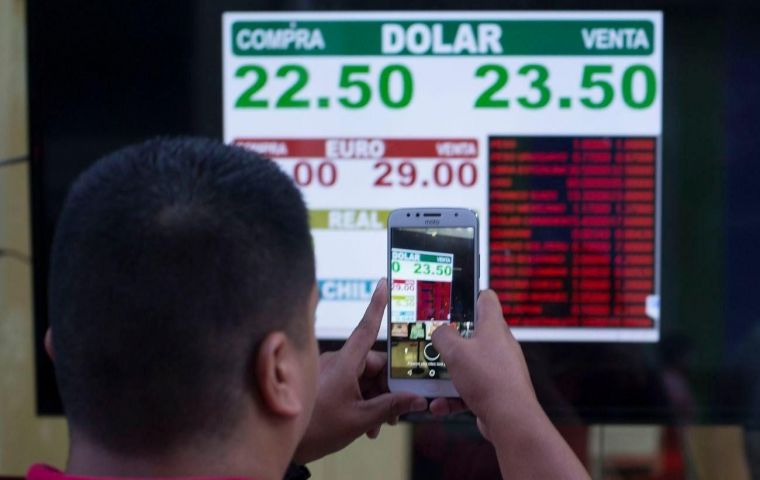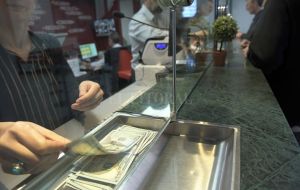MercoPress. South Atlantic News Agency
Argentine Peso tumbles 7.83% to US dollar; central bank raises rate to 33.25%
 The Peso tumbled 7.83% to 23 per U.S. dollar. It had hit 21.2 (23,5 in some banks) to the greenback on Wednesday. The central bank hiked the rate to 30.25% from 27.25% on Friday.
The Peso tumbled 7.83% to 23 per U.S. dollar. It had hit 21.2 (23,5 in some banks) to the greenback on Wednesday. The central bank hiked the rate to 30.25% from 27.25% on Friday.  The central bank said in a Thursday statement it would continue using all the tools at its disposal to achieve its 15% inflation target for the year
The central bank said in a Thursday statement it would continue using all the tools at its disposal to achieve its 15% inflation target for the year Argentina’s central bank raised its benchmark interest rate by 300 basis points to 33.25% percent on Thursday, but the second steep rate increase in less than a week failed to stop the country’s peso currency from swooning to a record low. The local currency tumbled 7.83% to 23 per U.S. dollar. It had hit 21.2 to the greenback on Wednesday, the first trading day due to a holiday after the bank hiked the rate to 30.25% from 27.25% on Friday.
The central bank, which over the past week has abandoned its schedule of reviewing monetary policy every other Tuesday, said in a Thursday statement it would continue using all the tools at its disposal to achieve its 15% inflation target for the year and could raise the interest rate again.
“Central bank should deemphasize the 15 percent inflation target for 2018. It is now even less credible as a target than it was before the recent currency move,” Goldman Sachs said in a note to clients. Consumer prices in Argentina rose 2.3% in March, putting 12-month inflation at 25.4%.
“The interest rate shock is a step in the right direction but there is no guarantee that it will immediately succeed in anchoring the foreign exchange market,” Goldman Sachs said. April consumer price data is set to be released on May 15.
The government had adopted policies aimed at spurring economic growth ahead of President Mauricio Macri’s expected 2019 re-election bid. The perception of political pressure on the bank to grease economic activity by keeping the money tap open had cast doubt on its willingness to raise interest rates.
Those doubts had evaporated by Thursday afternoon. The plummeting peso pointed to a lack of investor confidence in Latin America’s No. 3 economy, which is blighted by one of the world’s highest inflation rates despite Macri’s investor-friendly policies.
Emerging market assets in general have been under pressure in recent days against a backdrop of a rising dollar and higher global borrowing rates. Last week’s and Thursday’s rate increases were by far the biggest adjustment since the bank established its monetary policy rate in 2016.
Argentina’s century bond slipped to 86.03 on the dollar from 86.9 after Thursday’s rate announcement. The 100 year paper was issued in 2017 when optimism over Macri’s fiscal belt-tightening policies was still flying high among investors.
The central bank has heavily intervened in the spot market.
It said in a statement that it sold US$ 451 million on Thursday after selling about US$ 500 million the day before. This week’s interventions came on top of the bank selling US$ 6.771 billion in March and April, or more than 10% of its reserves.




Top Comments
Disclaimer & comment rules-

-

-

Read all commentsThere was mention of greedy and incompetent CEOs doing the economic planning now.
May 05th, 2018 - 12:16 am +3Was it known that they were incompetent when they took office, and what criteria were used to determine their competence? Or have we just decided they are incompetent now?
How does CFK minister of the economy, Alex Kiciloff, measure up to the same criteria used to measure the current economic managers competencies?
Or, are we saying they are incompetent because we don't like free market economics?
How is the Bolivarian non-free market economy performing in Venezuela?
Enrique, investigate a bit more. “Ratified plans” result from POLITICAL activity, meaning a vote in congress and ratification by the president. You know this administration has targeted:
May 06th, 2018 - 11:38 am +3- labor reform and liberalization, not there yet
- market-based pricing for energy and services
- continued wholesale privatization
In addition, the government has a slew of education reform, property title grants, public-private infrastructure projects, intellectual property reform, and social integration initiatives it is implementing. This government has been sprinting for 30 continuous months, desperately trying to execute these measures which, if fully implemented, will indeed create the necessary environment for private sector-led expansion. BTW, just look at the number of world-class air carrier operators developing commercial plans for the country, including Avianca, Norwegian, FlyBondi (FlyBaboo founder), and Irlandia Group’s JetSmart (also behind Viva Colombia + Peru).
Property investment is always the first sector targeted for private investment, as it is ‘easy low-hanging fruit’. Investments in transportation, information technology, digital media and marketing, retail-ecommerce, energy, power, infrastructure, and agriculture will naturally take more time. These ‘commercial investors’ are precisely the groups most focused on policy hiccups, like K-bancada’s irresponsible statements over price controls last week. The volatility originated over POLITICAL concerns; meaning economic agents were assessing the probability of continued liberalization vs. K-led ‘spanner in the works’ to screw things up.
Investors do not have an issue with Macri’s plan. They have an issue with that crazy lady trying to stop his agenda via POPULISM. If people haven’t figured it out yet, populism never works.
Enrique, 2017 fiscal deficit exceeded ARS 617 billion, approaching 6% GDP, very high indeed. But, don’t blame Macri for this, as was associated with existing pre-Cambiemos policies. Hacienda eliminated over 27% enterprise subsidies compared to prior year.
May 06th, 2018 - 09:42 pm +3Clearly, fiscal spending IS THE ISSUE feeding current market volatility. Again, this requires a POLITICAL solution, something Macri & Co. have been trying to accomplish.
They could have tried to crash spending a year ago but that requires congressional consensus, doesn’t it? BCRA could have goosed rates in December when Sturtzenegger wanted, and this is the one poor decision entirely blamed on the administration.
However, arguing the nation’s problems resulting from fiscal deficits are Macri’s fault, without taking into account national political reality smacks of delusion.
Commenting for this story is now closed.
If you have a Facebook account, become a fan and comment on our Facebook Page!